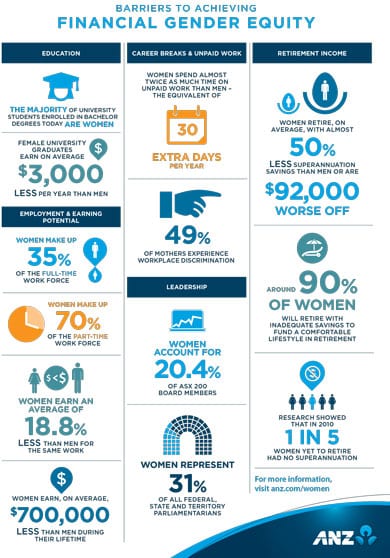There is one point that former Prime Minister Julia Gillard finds particularly disturbing in ANZ’s new paper on gender equality.
That’s the finding that female graduates earn an average 4% (or $3000) less than their male counterparts with exactly the same qualification.
We can’t blame it on taking career breaks to have children – very few of these graduates are yet to hit that milestone. Nor can we blame it on periods of working flexibly or part time.
“So what explanation can we possibly give them for why they’re being paid less?” asked Gillard. “For most women, that first pay differential is the start of a lifetime of financial inequality that becomes harder and harder to rectify.”
Gillard addressed a large room of influential men and women at the launch of the ANZ discussion paper on Wednesday. Supporting her later on a panel to discuss the issues raised were former LT David Morrison, ANZ CEO Mike Smith, former tennis player Martina Navratilova, and later ANZ chairman David Gonski.
The ANZ paper revealed a number of disturbing findings on pay, including that while women’s workforce participation has risen by more than 25% in 30 years, female full-time workers are being paid 18.8% less than men, amounting to $295 a week, $15,000 a year and around $700,000 over a woman’s lifetime.
It also found that women spend an extra 30 days per year in unpaid work, retire with almost 50% less superannuation, and account for just 20.4% of ASX 200 board members and 31% of all federal, state and territory parliamentarians.
According to ANZ CEO Mike Smith, it’s time for organisations to “get on the bus” to support gender equality. “We can’t just talk about this stuff. It’s stark. It’s confronting. And you have to ask, how has this happened and why has it happened?”
He could point to what his organisation is already doing: announcing a $500 per annum superannuation bonus for all women working permanently in the company, extending paid parental leave from 12 months to 24 months, offering free superannuation advice for customers with less than $50,000 in super, and introducing specialist financial planners to assist women. ANZ has also recently introduced an “All Roles Flex” policy, meaning staff can work from anywhere.
Smith believes the changes will result in greater engagement from staff across the organisation, and improve productivity. “What I’d say to businesses is that if you get this right, you’re going to be more successful. There is a business advantage in getting it right.”
Gillard told the audience that change is achievable, especially with targets and goals. She said that while the ANZ board is now one quarter female — a good achievement — it still has work to do. “Until members of the ANZ board, and boards of companies right around our nation can look around the room and see men and women in equal number, then we will continue to know that women of merit are missing out.
“Women of merit are out there. Go find them, it can be done. When you have found them, support them and empower them.”
Former LT David Morrison said that his experience in the Army in the last few years proves change is possible. “It’s about data. I’ll quote this stat that I’m most proud of … We went from below 10% of our workforce as women in 2011 to the point now where 25% of all cadets are women.” An extra 660 women have joined the Army since 2011.
“And guess what, Australian society has sat up and taken notice,” he said.
Morrison believes all leaders need to consider how we’re judging women, and how we can compare men and women in the room equally in order to get the best out of both genders.
Meanwhile Martina Navratilova offered some advice for women, drawn from her own experience in tennis. “Women, we tend to over analyse things and can concentrate on the negatives where we have failed, rather than the positive … In tennis, you just have to forget the failures because you have to hit the next ball.”
David Gonski closed the event by calling it a “wonderful moment” in his career chairing the bank. He left feeling reassured that a former prime minister believes gender inequality is a problem that can be fixed.
We all now need to participate in the solution.
See ANZ’s infographic on the White Paper findings below:



